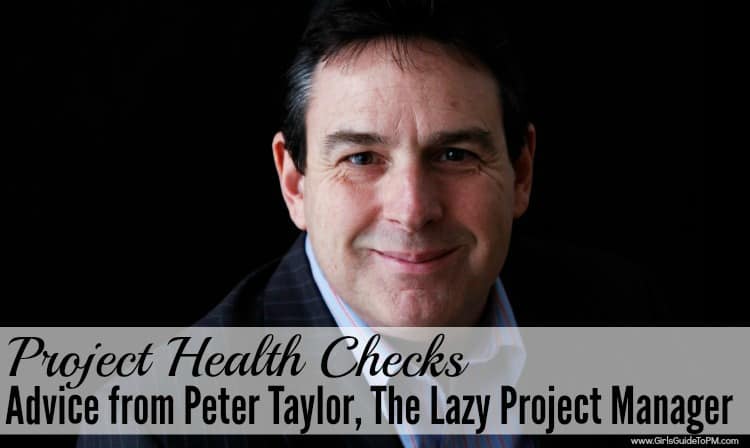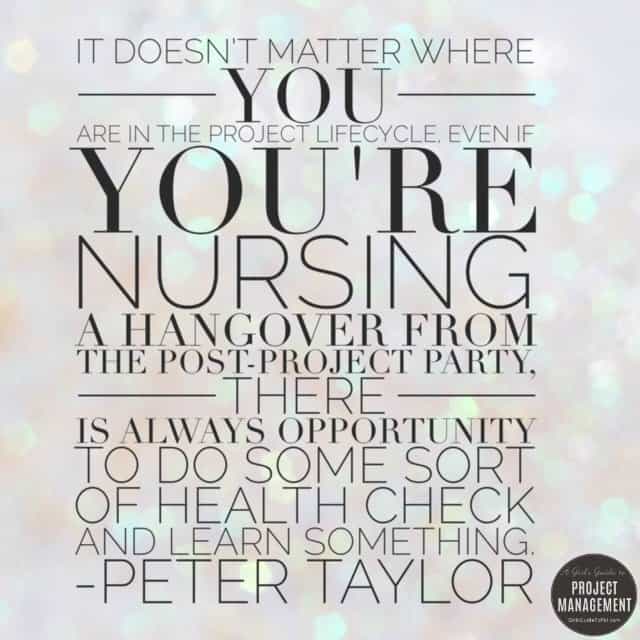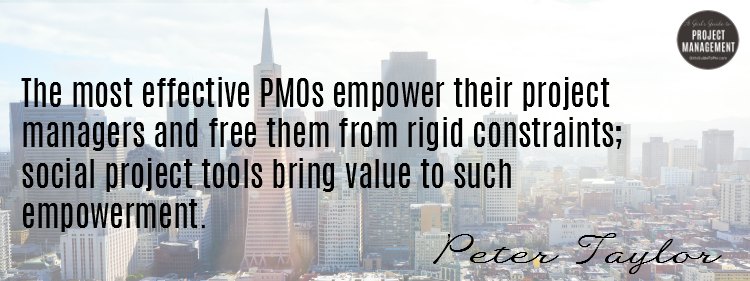Get Your Projects Fit with The Lazy Project Manager
This blog is reader-supported. When you purchase something through an affiliate link on this site, I may earn some coffee money. Thanks! Learn more.
I am not fit. Since having my two boys I am heavier than I have ever been, except while pregnant.
My only exercise is balancing in small spaces while standing on the train to work. I fuel getting up for the night feeds with cereal bars and chocolate croissants.
Luckily, my projects are healthier than I am. All projects benefit from a health check now and again. Peter Taylor, the Lazy Project Manager, has just written a book about it, Get Fit with The Lazy Project Manager.
I spoke to him about how to make sure our projects are as healthy as possible and don’t become the ‘ex-projects’ of tomorrow.
Peter, how does the Lazy Project Manager get fit?
Well, not through excessive physical activity in my case, although there is nothing wrong with that at all of course.
The new book is a look at the reason, the value, the process and the opportunities to assess the ‘health’ of your projects in order to sleep easier at night, safe in the knowledge of inevitable project success (and I am using the word ‘inevitable’ with the common meaning of ‘more likely than before’ you understand).
My inspiration for this book comes from many sources and many experiences of doing the right thing and running a ‘health check’, a ‘lessons learned’, a ‘retrospective’ etc and also from seeing the real consequences of submitting to all of those pressures out there in project management land that we all face, and not doing the right thing.
So in fact this is the ‘productive lazy’ thing to do, work smarter (in the short term by running a health check) and not harder (in the long term by letting project issues grow).
What’s the point of a health check?
It doesn’t matter where you are in the project lifecycle, even if you are nursing a wicked hangover from the post-project live celebratory party, there is always benefit and opportunity to do some sort of ‘health’ check and learn something of value.
Perhaps not for this project but certainly for the next one, and the one after that, and so on.
OK, so perhaps we should start with a clear understanding of the terminology. Tell me what you mean by health check.
There is often a lot of confusion with regards to the three, incorrectly interchangeably used terms – Audit, Health check and Post-mortem.
I was even astonished to hear someone once talk about going ‘
For clarity and intelligent application here are the dictionary definitions:
- Health check: A thorough physical examination; includes a variety of tests depending on the age and sex and health of the person.
- Audit: An official examination and verification of accounts and records, especially of financial accounts, a report or statement reflecting an audit; a final statement of account or the inspection or examination of a building or other facility to evaluate or improve its appropriateness, safety, efficiency, or the like.
- Post-mortem: Occurring or done after death, of or relating to a medical examination of a dead body (also autopsy). For further clarity and greater intelligent application think of it like this: When was the last time a person survived multiple autopsies?
Therefore a ‘health check’ for a project is an opportunity to assess likely success or outcome and take actions to improve that prognosis for the good of the project and the business.
OK, so what was the inspiration behind writing a whole book about it?
My inspiration for this book comes from many sources and many experiences of doing the right thing and running a ‘health check’, a ‘lessons learned’, a ‘retrospective’ etc and also from seeing the real consequences of submitting to all of those pressures out there in project management land that we all face, and not doing the right thing.
So in fact this is the ‘productive lazy’ thing to do, work smarter (in the short term by running a health check) and not harder (in the long term by letting project issues grow).
That sounds like the same overarching philosophy as I wrote about in my book, Customer-Centric Project Management. In that, the project manager creates continuous dialogue with the stakeholders to avoid the same problems and not let issues fester.
Does the project manager do the health check to?
Ideally a health check is run by someone external, but sympathetic, to the project – for objectivity.
There are tools that can be used and these are OK but the downside to them I have found is that they highlight the negative but don’t praise the positive.
The act of reviewing a peer’s project is one that requires tact, understanding, and strength of belief as well – not something a tool does.
The PMO, if you have one, can be an ideal source of facilitators who have the rights skills and experience to undertake the health check.

The project team are definitely to be involved; the facilitator will interview personnel from the project including but not limited to the project manager, project sponsor, end users and members of the project team and the health check will typically assess:
- Project organisation and staffing
- Project processes
- Project planning and reporting
- Requirements
- Budget and spend
- Benefits and outcomes.
There will be other aspects of course depending on the type of project that is under review – an IT project for example may take a close look at the technology e.g. software release/design, testing, systems architecture etc.
OK, I’m convinced and I know what to do. When should project managers run a health check?
At the very least I would suggest a health check is regularly undertaken at the end of the plan phase but ideally it can be done many times throughout the project.
There is a second time when a health check should be initiated and that really is ‘when it is needed’, that is if something has occurred that makes an urgent demand for an objective assessment of the project.
Don’t wait if this is before the end of the planning phase, and don’t discount a further health check just because you conducted a health check earlier in the project lifecycle.
What do you do get after the health check?
The output from the health check will be a formal report which will detail actions and recommendations that need to be agreed by the project steering board.
Fine. So what do you do with the results? Any tips for communicating the output to your stakeholders?
The work to do will include assigning the relevant actions with owners and planned completion date. It is the responsibility of the project manager, perhaps supported by the PMO, to chase up the actions to ensure they are completed in the appropriate time frame and report further to the steering board.
However you choose to report back on your health checks it is advisable to offer a visual representation along with any ‘wordy’ report.

Thanks, Peter. Tell us about your other work.
I have three more books, a follow up to Leading Successful PMOs which is called Delivering Successful PMOs, and a book on project marketing called Project Branding (RMC) along with a book all about what attracts and challenges young project managers to our profession called Real Project Management (Kogan Page).
This interview was first published in 2014.
Peter Taylor’s alter ego is The Lazy Project Manager. Peter’s book, Get Fit with The Lazy Project Manager is available from his website and from Amazon in eBook and printed format.




